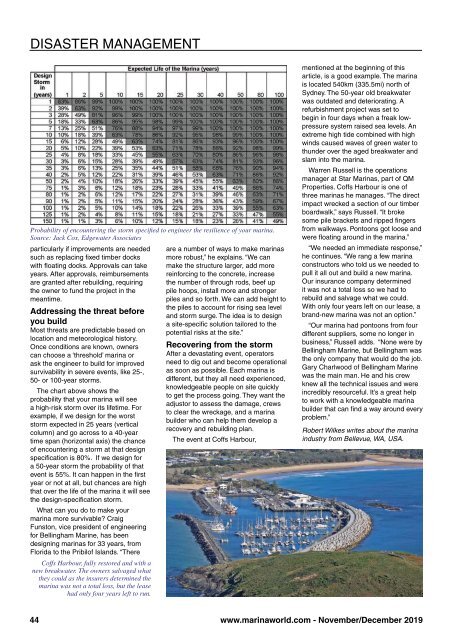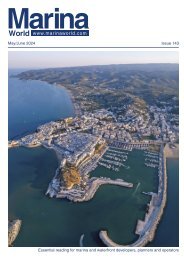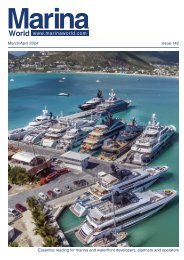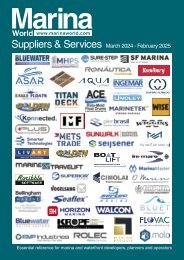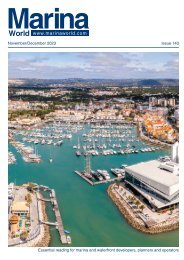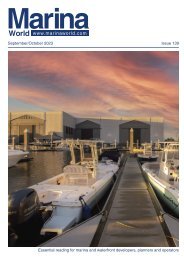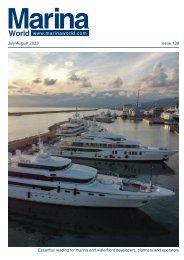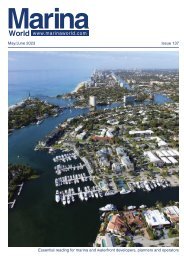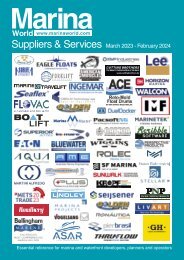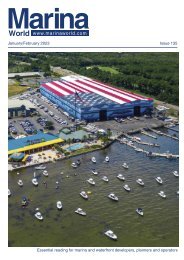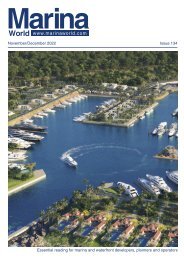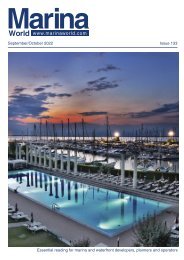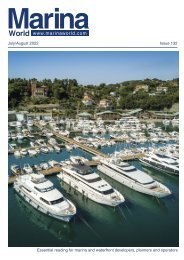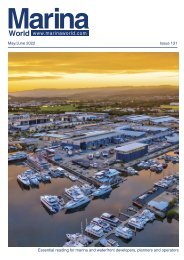November December 2019 Marina World
The magazine for the marina industry
The magazine for the marina industry
Create successful ePaper yourself
Turn your PDF publications into a flip-book with our unique Google optimized e-Paper software.
DISASTER MANAGEMENT<br />
Probability of encountering the storm specified to engineer the resilience of your marina.<br />
Source: Jack Cox, Edgewater Associates<br />
particularly if improvements are needed<br />
such as replacing fixed timber docks<br />
with floating docks. Approvals can take<br />
years. After approvals, reimbursements<br />
are granted after rebuilding, requiring<br />
the owner to fund the project in the<br />
meantime.<br />
Addressing the threat before<br />
you build<br />
Most threats are predictable based on<br />
location and meteorological history.<br />
Once conditions are known, owners<br />
can choose a ‘threshold’ marina or<br />
ask the engineer to build for improved<br />
survivability in severe events, like 25-,<br />
50- or 100-year storms.<br />
The chart above shows the<br />
probability that your marina will see<br />
a high-risk storm over its lifetime. For<br />
example, if we design for the worst<br />
storm expected in 25 years (vertical<br />
column) and go across to a 40-year<br />
time span (horizontal axis) the chance<br />
of encountering a storm at that design<br />
specification is 80%. If we design for<br />
a 50-year storm the probability of that<br />
event is 55%. It can happen in the first<br />
year or not at all, but chances are high<br />
that over the life of the marina it will see<br />
the design-specification storm.<br />
What can you do to make your<br />
marina more survivable? Craig<br />
Funston, vice president of engineering<br />
for Bellingham Marine, has been<br />
designing marinas for 33 years, from<br />
Florida to the Pribilof Islands. “There<br />
Coffs Harbour, fully restored and with a<br />
new breakwater. The owners salvaged what<br />
they could as the insurers determined the<br />
marina was not a total loss, but the lease<br />
had only four years left to run.<br />
are a number of ways to make marinas<br />
more robust,” he explains. “We can<br />
make the structure larger, add more<br />
reinforcing to the concrete, increase<br />
the number of through rods, beef up<br />
pile hoops, install more and stronger<br />
piles and so forth. We can add height to<br />
the piles to account for rising sea level<br />
and storm surge. The idea is to design<br />
a site-specific solution tailored to the<br />
potential risks at the site.”<br />
Recovering from the storm<br />
After a devastating event, operators<br />
need to dig out and become operational<br />
as soon as possible. Each marina is<br />
different, but they all need experienced,<br />
knowledgeable people on site quickly<br />
to get the process going. They want the<br />
adjustor to assess the damage, crews<br />
to clear the wreckage, and a marina<br />
builder who can help them develop a<br />
recovery and rebuilding plan.<br />
The event at Coffs Harbour,<br />
mentioned at the beginning of this<br />
article, is a good example. The marina<br />
is located 540km (335.5mi) north of<br />
Sydney. The 50-year old breakwater<br />
was outdated and deteriorating. A<br />
refurbishment project was set to<br />
begin in four days when a freak lowpressure<br />
system raised sea levels. An<br />
extreme high tide combined with high<br />
winds caused waves of green water to<br />
thunder over the aged breakwater and<br />
slam into the marina.<br />
Warren Russell is the operations<br />
manager at Star <strong>Marina</strong>s, part of QM<br />
Properties. Coffs Harbour is one of<br />
three marinas he manages. “The direct<br />
impact wrecked a section of our timber<br />
boardwalk,” says Russell. “It broke<br />
some pile brackets and ripped fingers<br />
from walkways. Pontoons got loose and<br />
were floating around in the marina.”<br />
“We needed an immediate response,”<br />
he continues. “We rang a few marina<br />
constructors who told us we needed to<br />
pull it all out and build a new marina.<br />
Our insurance company determined<br />
it was not a total loss so we had to<br />
rebuild and salvage what we could.<br />
With only four years left on our lease, a<br />
brand-new marina was not an option.”<br />
“Our marina had pontoons from four<br />
different suppliers, some no longer in<br />
business,” Russell adds. “None were by<br />
Bellingham Marine, but Bellingham was<br />
the only company that would do the job.<br />
Gary Charlwood of Bellingham Marine<br />
was the main man. He and his crew<br />
knew all the technical issues and were<br />
incredibly resourceful. It’s a great help<br />
to work with a knowledgeable marina<br />
builder that can find a way around every<br />
problem.”<br />
Robert Wilkes writes about the marina<br />
industry from Bellevue, WA, USA.<br />
44<br />
www.marinaworld.com - <strong>November</strong>/<strong>December</strong> <strong>2019</strong>


